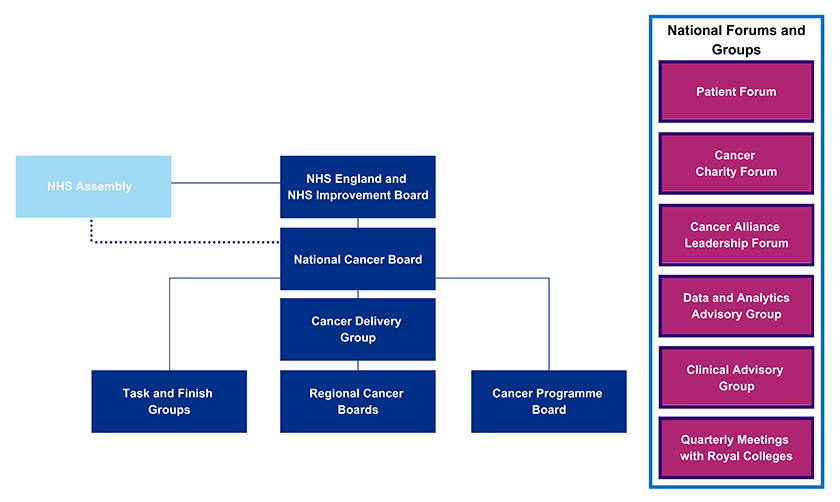Our governance and how to get involved
In order to deliver the NHS Long Term Plan for cancer it is important that we bring together the right people and partners to oversee, advise on and implement key parts of the programme.
Our governance structure enables this. It is designed to:
- increase the transparency of our work by making sure the cancer community is kept up to date on delivery and has the opportunity to hold us to account;
- increase involvement by getting a wide range of views on the overall delivery plan; and,
- build on the positive engagement from across the cancer community in developing the LTP, by increasing the involvement of colleagues from across the sector in the implementation of specific projects.
The main board overseeing the delivery of the LTP for cancer is the National Cancer Board. The members of the Board are drawn from across the cancer community:
- Cally Palmer (Chair), National Cancer Director, NHS England and Improvement
- Professor Peter Johnson, National Clinical Director for Cancer
- Liz Bishop, Chief Executive, The Clatterbridge Cancer Centre
- Phil Carver, Director (North), HEE
- Michael Chapman, Director of Research and Clinical Trials, NHSD
- Ben Day, Strategic Finance Director, NHS England and Improvement
- David Fitzgerald, Programme Director, NHS Cancer Programme, NHS England and Improvement
- Ceinwen Giles, Chair, NHS Cancer Programme Patient Forum
- Sue Hill, Chief Scientific Officer, NHS England and Improvement
- Tim Jones, Deputy Director, Acute Care and Provider Policy Team, DHSC
- Jane Lyons, Chief Executive, Cancer 52
- Michelle Mitchell, Chief Executive, Cancer Research UK
- Ann Radmore, Regional Director (East of England), NHS England and Improvement
- Ed Rose, Programme Director, NHS Cancer Programme, NHS England and Improvement
- Roger Spencer, Chief Executive, The Christie NHS Foundation Trust
- Deborah Tomalin, Director of Public Health Commissioning & Operations, NHS England and Improvement
- Lynda Thomas, Chief Executive, Macmillan Cancer Support
Task and finish groups
Task and finish groups work on specific projects for a set period of time so we can make the most of the expert advice of our stakeholders.
Some of our current task and finish groups include:
- Early Detection: advises on the roll out of lung checks in some of the areas with the highest mortality rates for lung cancer, taking forward recommendations from Sir Mike Richards’ screening review and extending the use of the faecal immunochemical test (FIT) in the NHS Bowel Cancer Screening Programme.
- Workforce: to identify, prioritise and spread actions to address workforce challenges and advise on the cancer workforce required to deliver the NHS LTP.
- Innovation Expert Advisory Group: responsible for supporting the NHS cancer programme team in developing the approach to funding innovation; assessing and prioritising the innovations and making recommendations around funding.
- Clinical Review of Standards Task and Finish Group: oversees the delivery and decision making of the Clinical Review of Standards (CRS) for the cancer programme.
National forums and groups
Patient and Public Voice Forum: for patient representatives from across the country to discuss and give advice on overall delivery and key projects. It provides opportunities for patients to get more involved in policy development and project delivery – for example, through task and finish groups. The chair is Ceinwen Giles, Director of Shine Cancer Support
Cancer Charity Forum: for cancer charities to offer advice and support on overall delivery and key projects. The forum keeps cancer charities up to date on policy development and opportunities to get more involved in project delivery. The forum is chaired by Lynda Thomas, Chief Executive, Macmillan Cancer Support.
Cancer Alliance Leadership Forum: for chairs, clinical leads and executive leads of Cancer Alliances to discuss local delivery, key projects and share best practice. The Chairs are Paula Head, Chair of the Wessex Cancer Alliance, and Andy Welch, Chair of the Northern Cancer Alliance.
There are three other national groups providing input on delivery of the LTP for cancer:
The Cancer Data and Analytics Advisory Group: chaired by the National Director for Disease Registration and Cancer Analysis, Public Health England, this group brings together stakeholders, arms’ length bodies and Cancer Alliances to advise on strategic analytical and data issues such as how best to measure progress in delivering the LTP and evaluate new interventions.
The Clinical Advisory Group: chaired by the National Clinical Director for Cancer, Professor Peter Johnson, this group will provide clinical advice on policy and implementation of the LTP.
Quarterly meetings with Royal Colleges: the NHS Cancer Programme will seek views and advice from Medical Royal Colleges as part of an ongoing engagement programme led by NHS England’s Medical Directorate.

